英语中主动形式表被动的用法
英语复习:主动形式表示被动意义的几种情况
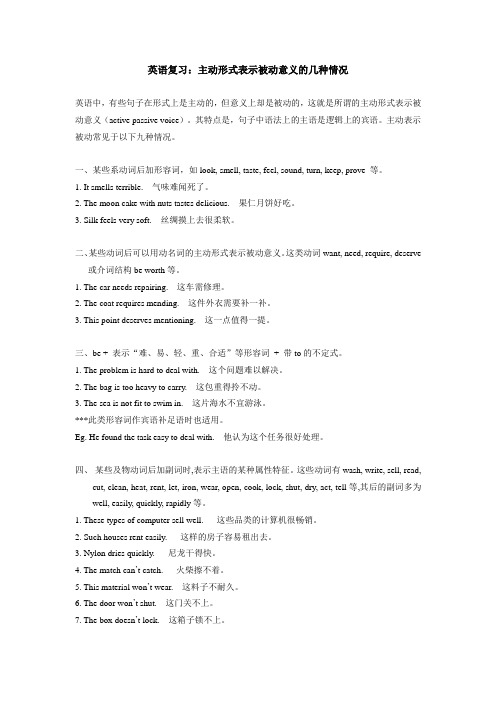
英语复习:主动形式表示被动意义的几种情况英语中,有些句子在形式上是主动的,但意义上却是被动的,这就是所谓的主动形式表示被动意义(active passive voice)。
其特点是,句子中语法上的主语是逻辑上的宾语。
主动表示被动常见于以下九种情况。
一、某些系动词后加形容词,如look, smell, taste, feel, sound, turn, keep, prove 等。
1. It smells terrible. 气味难闻死了。
2. The moon cake with nuts tastes delicious. 果仁月饼好吃。
3. Silk feels very soft. 丝绸摸上去很柔软。
二、某些动词后可以用动名词的主动形式表示被动意义。
这类动词want, need, require, deserve或介词结构be worth等。
1. The car needs repairing. 这车需修理。
2. The coat requires mending. 这件外衣需要补一补。
3. This point deserves mentioning. 这一点值得一提。
三、be + 表示“难、易、轻、重、合适”等形容词+ 带to的不定式。
1. The problem is hard to deal with. 这个问题难以解决。
2. The bag is too heavy to carry. 这包重得拎不动。
3. The sea is not fit to swim in. 这片海水不宜游泳。
***此类形容词作宾语补足语时也适用。
Eg. He found the task easy to deal with. 他认为这个任务很好处理。
四、某些及物动词后加副词时,表示主语的某种属性特征。
这些动词有wash, write, sell, read,cut, clean, heat, rent, let, iron, wear, open, cook, lock, shut, dry, act, tell等,其后的副词多为well, easily, quickly, rapidly等。
英语中的主动表被动

英语中主动形式表被动意义的情况一般说来,表示被动意义要用被动结构,但是,英语中也有以下几种情况是用主动形式表达被动意义的:1. 某些连系动词如look, sound, smell, taste, prove, feel等,习惯以主动语态形式表示被动的意义。
例如:The flower smells sweet.这花闻起来香。
Good medicine tastes bitter.良药苦口。
The silk feels soft.丝绸摸起来很软。
但是,当上述动词不用作系动词时,则不具有这种用法。
例如:His heart was felt still beating.他的心脏仍在跳动。
Pepper can be tasted in the soup.汤里有胡椒粉的味道。
2. 当open, close, shut, lock, move, read, write, wash, sell, clean, cook, burn, draw, cut, wear, begin, start, finish, end, keep等词用作不及物动词表示主语的某种属性、特征或所处状态(常与easily, quickly, well等副词连用),而非强调动作本身时,通常用主动形式表示被动意义。
例如: The table can’t move.这桌子移不动。
The door is easily locked.这门容易锁上。
The poem reads smoothly.这诗读起来很流畅。
When does the concert begin? 音乐会什么时候开始?The peaches don’t keep well.这些桃子不容易保存。
但是,有的时候也要看具体情况而定,例如:This book sells well. So far, 200 books have been sold out.这种书卖得很好,到目前,已经卖出了两百本。
英语主动表被动用法归纳
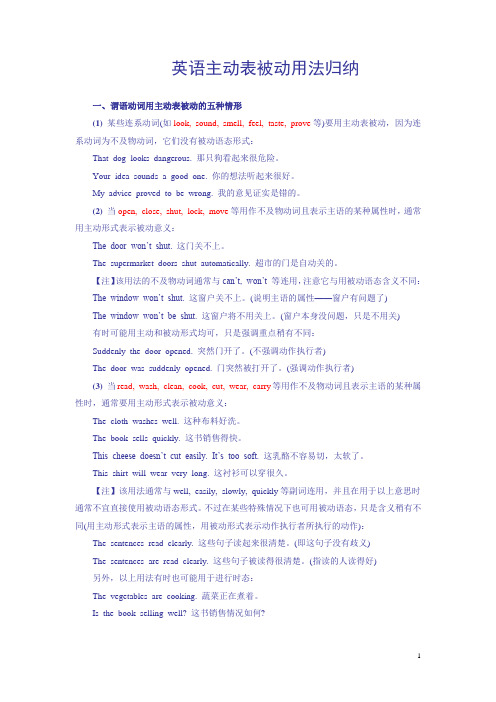
英语主动表被动用法归纳一、谓语动词用主动表被动的五种情形(1)某些连系动词(如look, sound, smell, feel, taste, prove等)要用主动表被动,因为连系动词为不及物动词,它们没有被动语态形式:That dog looks dangerous. 那只狗看起来很危险。
Your idea sounds a good one. 你的想法听起来很好。
My advice proved to be wrong. 我的意见证实是错的。
(2)当open, close, shut, lock, move等用作不及物动词且表示主语的某种属性时,通常用主动形式表示被动意义:The door won’t shut. 这门关不上。
The supermarket doors shut automatically. 超市的门是自动关的。
【注】该用法的不及物动词通常与can’t, won’t 等连用,注意它与用被动语态含义不同:The window won’t shut. 这窗户关不上。
(说明主语的属性——窗户有问题了)The window won’t be shut. 这窗户将不用关上。
(窗户本身没问题,只是不用关)有时可能用主动和被动形式均可,只是强调重点稍有不同:Suddenly the door opened. 突然门开了。
(不强调动作执行者)The door was suddenly opened. 门突然被打开了。
(强调动作执行者)(3)当read, wash, clean, cook, cut, wear, carry等用作不及物动词且表示主语的某种属性时,通常要用主动形式表示被动意义:The cloth washes well. 这种布料好洗。
The book sells quickly. 这书销售得快。
This cheese doesn’t cut easily. It’s too soft. 这乳酪不容易切,太软了。
主动形式表被动意义英语用法
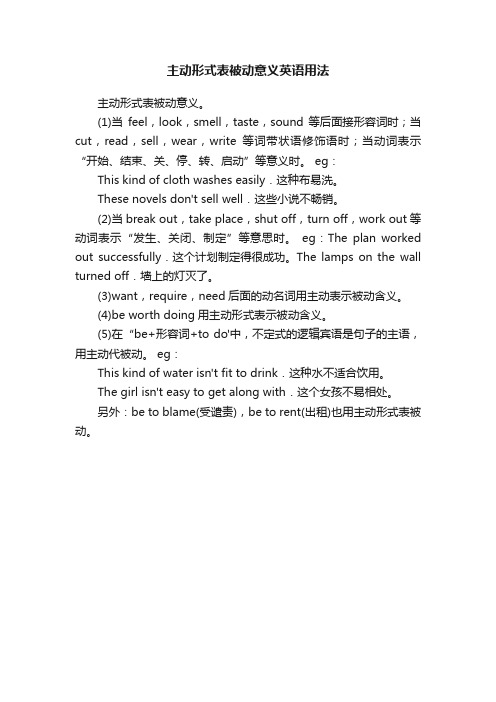
主动形式表被动意义英语用法
主动形式表被动意义。
(1)当feel,look,smell,taste,sound等后面接形容词时;当cut,read,sell,wear,write等词带状语修饰语时;当动词表示“开始、结束、关、停、转、启动”等意义时。
eg:
This kind of cloth washes easily.这种布易洗。
These novels don't sell well.这些小说不畅销。
(2)当break out,take place,shut off,turn off,work out等动词表示“发生、关闭、制定”等意思时。
eg:The plan worked out successfully.这个计划制定得很成功。
The lamps on the wall turned off.墙上的灯灭了。
(3)want,require,need后面的动名词用主动表示被动含义。
(4)be worth doing用主动形式表示被动含义。
(5)在“be+形容词+to do'中,不定式的逻辑宾语是句子的主语,用主动代被动。
eg:
This kind of water isn't fit to drink.这种水不适合饮用。
The girl isn't easy to get along with.这个女孩不易相处。
另外:be to blame(受谴责),be to rent(出租)也用主动形式表被动。
英语中主动表被动的用法

1. 某些连系动词,如look, sound, smell, taste, prove, feel等,由于没有宾语,也就没有被动式,习惯以主动语态形式表示被动意义。
例如:Your reason sounds reasonable. 你的理由听起来很合理。
The flower smells sweet. 这花闻起来香。
Good medicine tastes bitter. 良药苦口。
The silk feels soft. 丝绸摸起来很软。
但是,当上述动词不用作系动词,作实意动词时,则不具有这种用法。
例如:His heart was felt still beating. 他的心脏仍在跳动。
Pepper can be tasted in the soup.汤里有胡椒粉的味道。
2. 一些动词read, wash, clean, cook, lock,shut,open,act,write,cut,wear、want、need、等,用作不及物动词时且表示主语的某种属性时,用主动表被动。
例如:The door won’t open.这门打不开。
It can’t move.它不能动。
【注意】该用法的不及物动词通常与can’t(不能), won’t(不会)等连用,注意它与用被动语态含义不同:The window won’t shut. 这窗户关不上。
(说明主语的属性——窗户有问题了) The window won’t be shut. 这窗户将不用关上。
(窗户本身没问题,只是不用关)3、need,want,require(要求,需要),deserve(应得,值得),cannot bear(经不住)后面接doing主动表被动。
The old building requires repairing.这座古建筑需要修了。
These young seedlings will require/need looking after carefully.(=need to be looked after)这些幼苗将需要小心的照管。
英语中主动表被动的用法
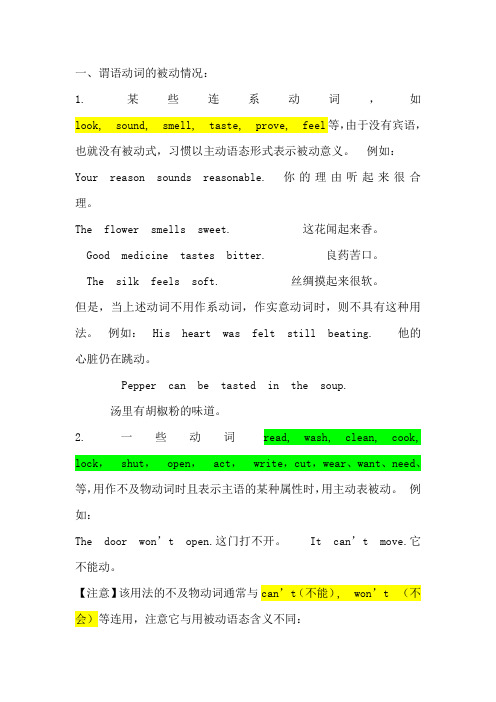
一、谓语动词的被动情况:1. 某些连系动词,如look, sound, smell, taste, prove, feel等,由于没有宾语,也就没有被动式,习惯以主动语态形式表示被动意义。
例如:Your reason sounds reasonable. 你的理由听起来很合理。
The flower smells sweet. 这花闻起来香。
Good medicine tastes bitter. 良药苦口。
The silk feels soft. 丝绸摸起来很软。
但是,当上述动词不用作系动词,作实意动词时,则不具有这种用法。
例如:His heart was felt still beating. 他的心脏仍在跳动。
Pepper can be tasted in the soup.汤里有胡椒粉的味道。
2. 一些动词read, wash, clean, cook, lock,shut,open,act,write,cut,wear、want、need、等,用作不及物动词时且表示主语的某种属性时,用主动表被动。
例如:The door won’t open.这门打不开。
It can’t move.它不能动。
【注意】该用法的不及物动词通常与can’t(不能), won’t(不会)等连用,注意它与用被动语态含义不同:The window won’t shut. 这窗户关不上。
(说明主语的属性——窗户有问题了) The window won’t be shut. 这窗户将不用关上。
(窗户本身没问题,只是不用关)3、need,want,require(要求,需要),deserve(应得,值得),cannot bear(经不住)后面接doing主动表被动。
The old building requires repairing.这座古建筑需要修了。
These young seedlings will require/need looking after carefully.(=need to be looked after)这些幼苗将需要小心的照管。
主动语态表被动意义的几种情况
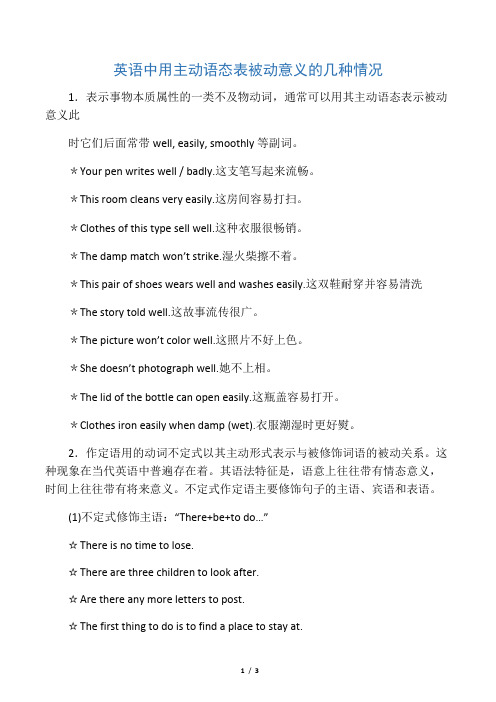
英语中用主动语态表被动意义的几种情况1.表示事物本质属性的一类不及物动词,通常可以用其主动语态表示被动意义此时它们后面常带well, easily, smoothly等副词。
*Your pen writes well / badly.这支笔写起来流畅。
*This room cleans very easily.这房间容易打扫。
*Clothes of this type sell well.这种衣服很畅销。
*The damp match won’t strike.湿火柴擦不着。
*This pair of shoes wears well and washes easily.这双鞋耐穿并容易清洗*The story told well.这故事流传很广。
*The picture won’t color well.这照片不好上色。
*She doesn’t photograph well.她不上相。
*The lid of the bottle can open easily.这瓶盖容易打开。
*Clothes iron easily when damp (wet).衣服潮湿时更好熨。
2.作定语用的动词不定式以其主动形式表示与被修饰词语的被动关系。
这种现象在当代英语中普遍存在着。
其语法特征是,语意上往往带有情态意义,时间上往往带有将来意义。
不定式作定语主要修饰句子的主语、宾语和表语。
(1)不定式修饰主语:“There+be+to do…”☆There is no time to lose.☆There are three children to look after.☆Are there any more letters to post.☆The first thing to do is to find a place to stay at.(2)不定式修饰宾语:“have sth. to do”☆Do you have anything to say for yourself?☆I have a large family to support.☆You must find something to do while waiting there.(3)不定式修饰表语:☆He is not a man to depend on.☆She is an easy girl to deal with.☆Tom is the very person to believe in/ trust.3.与形容词连用,表示结果的不定式,也具备主动形式,表示被动意义的语法特征,句子的主语即是动词不定式逻辑上的宾语。
主动形式表被动的用法

主动形式表被动的用法一、某些系动词:feel,look,seem,appear,taste,sound,smell,prove,remain等用主动形式表示被动意义,主语通常是事物,且表示该事物本身具有某一固有特征。
如:The material feels very soft.这种料子摸起来很柔软。
误:The material is felt very soft.The music sounds beautiful.这音乐听起来很美妙。
误:The music is sounded beautiful.二、表示主语由内在品质或性能,使得主语得以实现或不能实现,用主动表示被动,常见的这类动词有:write,read,clean,sell,wash,cook,open,close,lock等。
1.同well,badly,easily等副词连用。
如:The cloth washes easily.这布很好洗。
The book sells well.那本书很畅销。
The pen writes smoothly.这支笔很好写。
2.谓语动词用否定式。
如:The window won’t open.这扇窗开不了。
The door won’t lock.这门锁不上。
3.主语+谓语(blow,wear等)+主补。
如:The door blew open.门被风吹开了。
三、某些日常用语:cook,bake,make,print,pack,build,work out等动词用于进行时态时,可用主动形式表示被动意义。
如:The fish is cooking.鱼正在煮。
The book is printing.那本书正在印刷中。
The plan is working out.计划正在制订。
四、不定式在下列情况下用主动形式表示被动意义。
1.在“be+形容词+fit to do”句型中。
如:English words are difficult to remember.英语单词很难记。
- 1、下载文档前请自行甄别文档内容的完整性,平台不提供额外的编辑、内容补充、找答案等附加服务。
- 2、"仅部分预览"的文档,不可在线预览部分如存在完整性等问题,可反馈申请退款(可完整预览的文档不适用该条件!)。
- 3、如文档侵犯您的权益,请联系客服反馈,我们会尽快为您处理(人工客服工作时间:9:00-18:30)。
英语中主动形式表被动的用法
1.表示被动含义的主动动词
1)系动词没有被动形式,但有些系动词常表示被动意义。
常见的有taste(吃起来), sound (听起来), prove(证明是), feel(摸上去感到)等,例如:
Your reason sounds reasonable.你的理由听起来很合理。
Good medicine tastes bitter to the mouth.良药苦口。
2)一些与can't(不能)或won't(不会)连用的动词。
常用的有: lock(锁住), shut(关上) , open(打开,营业), close(关门), cut(切割), weigh(重), act(上演),例如: The door won't open. 这门打不开。
It can't move. 它不能动。
This shop opens much earlier than it used to.
Each stone weighs 2 tons.
3)一些与well(很), easily(容易地), perfectly(十分地)等连用的动词,如: sell, wash, clean, burn, cook, wash, write, last, read, wear等。
这种“动词+副词”结构,常表示事物内部特有的属性。
例如:
The book sells well.这种书很畅销。
These clothes wash well.这些衣服很耐洗。
4) 用在“主语+不及物动词+主语补语”句型中的一些不及物动词, 例如:
This material has worn thin.这料子已磨薄了。
The dust has blown into the house.灰尘被风吹进了房子。
This kind of cloth washes well and lasts long.
The pen my father gave me as a birthday gift writes smoothly.
Written in simple English, this article reads easily.
5) 某些不及物动词,如happen, occur, cost以及短语,如come out(出版), come up (出现), come into being(产生)come to one’s mind(想起), turn out(证明是), come about(发生), break out(爆发), belong to(属于)等,本身表被动含义,所以它们常用主动形式。
The first textbooks written for teaching English as a foreign language came out in the 18th century.
Suddenly an idea came to his mind.
It never occurred to me to phone you.
2.表示被动含义的主动结构
1)动名词
be worth(值得), want (=need)(需要), need(需要), require(需要)deserve(应该)等后所用的动名词,必须用主动结构表示被动意义,例如:
These young seedlings will require/need looking after (=need to be looked after) carefully.这些幼苗将需要小心的照管。
Your hair wants/needs cutting (needs to be cut).你的头发该剪了。
2)不定式
作定语:不定式结构常表示动宾关系,即用不定式的主动形式表示被动意义。
这种情形最常出现在“There+be+主语+修饰主语的不定式”和“及物动词+宾语(或双宾语)+修饰宾语的不定式”结构中,特别是“主语+have+宾语+修饰宾语的不定式”
结构中,例如:
Give him some books to read.给他点书看。
He has a family to support.他要维持一个家庭。
There is a lot of work to do.有许多工作要干。
当然,这里的不定式在个别情形下也可用被动形式,含义区别不大,例如:
There is so much work to do/to be done.有这么多事情要做。
Give me the names of the people to contact/to be contacted.
把那些要联系的人的名字给我。
在“主语+be+形容词+不定式”句型中,有时主语是不定式结构的逻辑宾语,这是应用主动形式表示被动含义。
适合于此结构的形容词比较多,最常用的有amusing(有趣的), cheap(便宜的), dangerous(危险的), difficult(困难的), easy(容易的), important(重要的), nice(令人愉快的), pleasant(愉快的)等,例如:
That question is difficult to answer.那个问题不容易回答。
Chicken’s legs are nice to eat.鸡腿很好吃。
在be to结构中的一些不定式:这种结构中的不定式通常应用主动表主动,被动表被动。
然而,由于古英语的影响,下列动词仍用不定式的主动形式表示被动意义: Who is to blame for starting the fire ?这场火灾应由谁负责?
The house is to let. 此房出租。
3)特殊结构
①“be + under +名词”结构:这种结构表示某事“在进行中”。
例如:
The building is under construction.这座楼正在建设中。
The whole matter is under discussion (=is being discussed).整个事情正在讨论中。
经常这样用的名词还有repair(修理), treatment(治疗), question(质问)等。
②“be worthy of +名词”结构:在这一结构中,名词和句子的主语有被动含义,如:
a man worthy of support 一个值得支持的人
nothing worthy of praise 没有值得称道的事情
此结构后通常用表示行为的名词,而不用动名词的被动形式。
[高考例题]
(1)The evening news comes on at seve n o’clock and _______ only thirty minutes.
A. keeps
B. continues
C. finishes
D. lasts (2)---- Mummy, can I put the peaches in the cup board?
---- No, dear. They don’t ____ well. Put them in the fridge instead.
A. keep
B. fit
C. get
D. last (3)Books of this kind _________ well.
A. sell
B. sells
C. are sold D .is sold ( key: DAA)。
